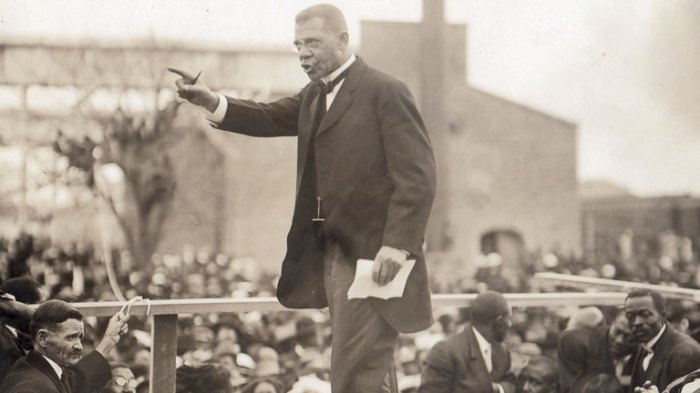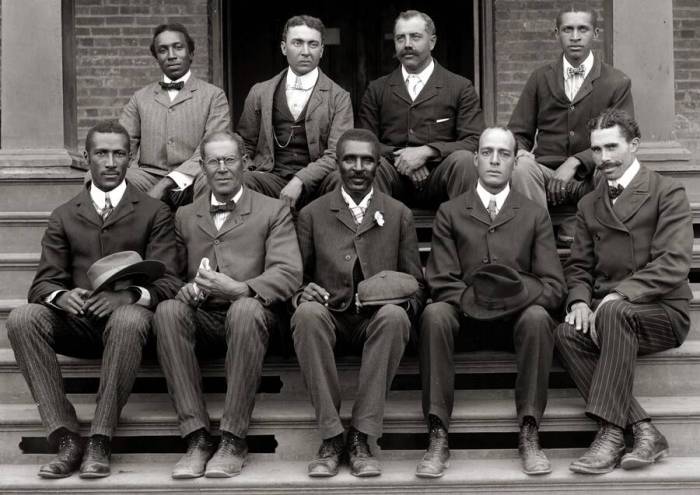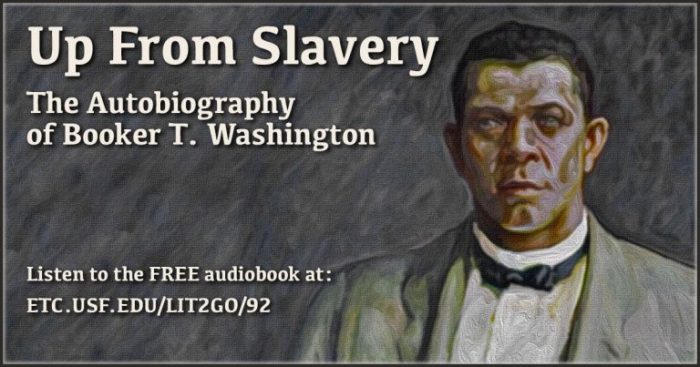Booker t. washington apush definition – Booker T. Washington’s legacy as an influential figure in American history is deeply intertwined with his dedication to industrial education and civil rights advocacy. This exploration of Booker T. Washington’s APUSH definition delves into his early life, educational philosophy, and significant contributions to the advancement of African Americans.
Born into slavery in 1856, Washington’s early life was marked by challenges and obstacles. Despite these hardships, he emerged as a passionate advocate for education, believing it to be the key to racial uplift. His establishment of Tuskegee Institute in 1881 became a cornerstone of his educational philosophy, emphasizing vocational training and self-reliance.
Booker T. Washington’s Early Life and Education
Booker T. Washington was born into slavery in 1856 on a plantation in Virginia. His mother, Jane, was a slave, and his father, who was never identified, was likely a white man. Washington’s early life was marked by poverty and hardship.
He was forced to work long hours in the fields from a young age, and he had little opportunity for education.
Despite the challenges he faced, Washington was determined to learn. He attended night school and eventually earned his freedom. In 1872, he enrolled at Hampton Institute, a historically black college in Virginia. At Hampton, Washington excelled in his studies and became a leader among his peers.
He graduated in 1875 and went on to found Tuskegee Institute, a vocational school for African Americans.
Influences on Washington’s Early Development
Several significant influences shaped Washington’s early development. First, his mother was a strong and determined woman who instilled in him the importance of education and hard work. Second, his experiences as a slave taught him the value of self-reliance and the importance of fighting for his rights.
Finally, his education at Hampton Institute provided him with the knowledge and skills he needed to become a successful leader.
Tuskegee Institute and the Philosophy of Industrial Education

Under the leadership of Booker T. Washington, Tuskegee Institute was founded in 1881 as a private, historically black college in Tuskegee, Alabama. Washington’s vision for the institute was to provide African Americans with practical education in agriculture, industry, and home economics.
He believed that through industrial education, African Americans could develop the skills and knowledge necessary for economic self-sufficiency and social advancement.
Washington’s Philosophy of Industrial Education
Washington’s philosophy of industrial education was based on the idea that African Americans needed to learn practical skills that would enable them to contribute to the economy and become self-sufficient. He believed that traditional academic education was not as valuable for African Americans as practical training in trades and agriculture.
Washington argued that industrial education would help African Americans to overcome the economic and social barriers they faced.
Impact of Tuskegee Institute
Tuskegee Institute had a significant impact on the development of vocational and technical training in the United States. The institute’s model of industrial education was adopted by other schools and colleges across the country. Tuskegee Institute also played a role in the development of the Tuskegee Airmen, a group of African American pilots who fought in World War II.
The Tuskegee Airmen were trained at Tuskegee Institute, and their success helped to break down racial barriers in the military.
Washington’s Role in the Civil Rights Movement
Booker T. Washington emerged as a prominent figure in the civil rights movement during the late 19th and early 20th centuries. His approach to advocacy differed from more confrontational tactics, emphasizing gradualism and economic empowerment as the path to racial equality.
Gradualism and Economic Empowerment
Washington believed that African Americans should focus on acquiring practical skills and economic self-sufficiency before engaging in direct political or social activism. He argued that by demonstrating their worth through hard work and education, they could gradually earn the respect and recognition of white society.
Strengths and Limitations
Washington’s strategy had both strengths and limitations. On the one hand, it provided a pragmatic and achievable path for African Americans to improve their lives and gain economic independence. It also helped to create a sense of self-reliance and pride within the African American community.
On the other hand, Washington’s emphasis on gradualism was criticized by more radical activists, who argued that it was too slow and conciliatory. They believed that more direct and confrontational tactics were necessary to achieve meaningful change.
Washington’s Legacy and Impact
Booker T. Washington’s legacy is complex and multifaceted. He was a controversial figure during his lifetime, and his ideas continue to be debated today. However, there is no doubt that he was a major force in American history, and his contributions to education, race relations, and social justice are undeniable.
Ongoing Debates and Controversies
One of the most controversial aspects of Washington’s legacy is his philosophy of industrial education. Washington believed that African Americans should focus on acquiring vocational skills that would allow them to become economically independent. This approach was criticized by some, who argued that it perpetuated the segregation of African Americans and limited their opportunities for higher education.
However, Washington’s supporters argued that his approach was realistic and practical, given the limited opportunities available to African Americans at the time.
Relevance of Washington’s Ideas in Contemporary Times
The debate over Washington’s legacy continues today. Some scholars argue that his ideas are still relevant in contemporary times, while others argue that they are outdated and no longer applicable. However, there is no doubt that Washington’s contributions to education, race relations, and social justice have had a lasting impact on American society.
Contributions to Education
Washington’s most significant contribution to education was the founding of Tuskegee Institute. Tuskegee was a vocational school that provided African Americans with the skills they needed to succeed in the workforce. Washington believed that education was the key to racial progress, and he dedicated his life to providing African Americans with access to quality education.
Contributions to Race Relations
Washington was also a leading figure in the civil rights movement. He was a close advisor to President Theodore Roosevelt, and he helped to negotiate the end of segregation in the federal government. Washington also worked to improve race relations through his writings and speeches.
He argued that African Americans should work to improve their own lives, rather than relying on white people to help them.
Contributions to Social Justice
In addition to his work in education and race relations, Washington was also a strong advocate for social justice. He fought for the rights of African Americans, women, and the poor. He also spoke out against lynching and other forms of racial violence.
Washington’s Writings and Speeches

Booker T. Washington’s literary and oratorical works played a significant role in shaping public opinion and advancing the cause of African Americans during the late 19th and early 20th centuries.
Main Themes and Ideas
Washington’s writings and speeches centered on several key themes:
- Economic Empowerment:He emphasized the importance of education and vocational training for African Americans to achieve economic self-sufficiency.
- Industrial Education:Washington believed that industrial education, which emphasized practical skills, was essential for African Americans to compete in the job market.
- Accommodation:Washington advocated for a gradualist approach to racial equality, urging African Americans to focus on improving their economic and educational status rather than engaging in direct confrontation.
- Self-Help:He emphasized the importance of self-reliance and collective action among African Americans to improve their own communities.
Impact of Washington’s Rhetoric
Washington’s persuasive rhetoric had a profound impact on both African Americans and white audiences:
- Inspiration and Empowerment:His speeches and writings inspired African Americans to pursue education, economic independence, and social progress.
- Moderate White Support:Washington’s message of accommodation and self-help appealed to some white audiences, who saw him as a pragmatic and non-threatening advocate for African American rights.
- Division within the African American Community:Washington’s emphasis on economic empowerment and gradualism was criticized by some African American activists, who argued that it compromised their demands for immediate social and political equality.
Comparisons and Contrasts with Other Civil Rights Leaders
Booker T. Washington, W.E.B. Du Bois, and Frederick Douglass were three prominent civil rights leaders during the late 19th and early 20th centuries. While they shared a common goal of racial equality, their approaches to achieving this goal differed significantly.
Philosophies
Washington’s philosophy, known as the Atlanta Compromise, emphasized economic self-reliance and vocational education as the primary means to improve the lives of African Americans. He believed that by demonstrating their economic value, African Americans could gradually gain respect and equal rights.
Du Bois, on the other hand, advocated for a more confrontational approach, calling for immediate political and social equality through education and activism. Douglass’s philosophy was more nuanced, combining elements of both Washington’s and Du Bois’s approaches.
Strategies
Washington’s strategy focused on establishing vocational schools, such as the Tuskegee Institute, where African Americans could learn practical skills. He also encouraged African Americans to start their own businesses and build a strong economic base. Du Bois’s strategy emphasized higher education and political agitation.
He founded the Niagara Movement and the NAACP to fight for civil rights through legal challenges, protests, and lobbying. Douglass used his platform as a renowned orator and abolitionist to advocate for equality and the end of slavery.
Tactics
Washington’s tactics were often conciliatory and pragmatic. He sought to work within the existing social and political system, avoiding confrontations that might alienate white allies. Du Bois’s tactics were more confrontational and militant. He organized protests, boycotts, and legal challenges to fight for equal rights.
Douglass used a combination of both conciliatory and confrontational tactics, depending on the situation.
Historical Context
The historical context in which these leaders operated influenced their approaches. Washington’s Atlanta Compromise was a response to the rise of Jim Crow laws and the disenfranchisement of African Americans in the South. Du Bois’s more confrontational approach was influenced by the growing frustration with the slow pace of progress and the increasing violence against African Americans.
Douglass’s nuanced philosophy reflected his experiences as a slave, an abolitionist, and a politician.
Washington’s Influence on Education and Social Reform: Booker T. Washington Apush Definition

Booker T. Washington’s profound influence on education and social reform movements shaped the trajectory of African American progress in the United States. His philosophy of industrial education and self-reliance played a pivotal role in the development of educational institutions and the advancement of social justice.
Washington’s belief in the importance of vocational training led to the establishment of Tuskegee Institute in 1881. Tuskegee became a model for other African American schools, emphasizing practical skills such as agriculture, carpentry, and mechanics. Washington’s philosophy aimed to provide African Americans with the tools to become economically independent and self-sufficient.
Impact on African American Education
Washington’s influence on African American education extended beyond Tuskegee. He played a key role in securing funding for black schools from philanthropic organizations and the federal government. His efforts helped to establish a network of schools and colleges that provided educational opportunities for African Americans.
Social Reform and the Atlanta Compromise
Washington’s ideas also influenced social reform movements. He advocated for gradualism and accommodation within the existing social structure. His famous “Atlanta Compromise” speech in 1895 urged African Americans to focus on economic development and education rather than immediate political equality.
While his approach was criticized by some for being too conciliatory, it helped to reduce racial tensions and paved the way for incremental social progress.
Legacy in Education and Social Policy, Booker t. washington apush definition
Washington’s legacy continues to shape educational and social policies today. His emphasis on vocational education remains a cornerstone of many educational programs aimed at marginalized communities. His belief in self-reliance and economic empowerment continues to inspire social reform movements that seek to address racial inequality and promote social justice.
Historical Context and Significance

Booker T. Washington’s life and work were profoundly shaped by the historical context of the post-Reconstruction era in the United States. The social, economic, and political conditions of this period had a significant impact on his experiences, beliefs, and the strategies he advocated for racial advancement.
The post-Reconstruction era was characterized by the rise of Jim Crow segregation and disenfranchisement of African Americans in the South. The social order was defined by white supremacy, and racial violence was rampant. Economic opportunities for African Americans were severely limited, and they faced widespread poverty and discrimination.
Significance of Washington’s Contributions
In this context, Booker T. Washington’s contributions were significant in several ways. His philosophy of industrial education aimed to provide African Americans with practical skills and economic self-sufficiency, empowering them to overcome the barriers they faced. Washington’s advocacy for gradualism and accommodationism, while controversial, helped to build relationships with white leaders and secure funding for Tuskegee Institute.
Washington’s work also played a crucial role in shaping the broader civil rights movement. His ideas influenced other leaders, such as W.E.B. Du Bois, and helped to lay the foundation for future strategies for racial equality.
Key Questions Answered
What was Booker T. Washington’s approach to civil rights advocacy?
Washington advocated for gradualism and economic empowerment as a means to achieve racial equality, believing that African Americans should focus on acquiring skills and building economic independence before seeking full political and social equality.
What was the significance of Tuskegee Institute?
Tuskegee Institute, founded by Booker T. Washington in 1881, became a prominent center for industrial education, providing African Americans with vocational training and practical skills to enhance their economic opportunities.
How did Booker T. Washington’s legacy influence education and social reform?
Washington’s emphasis on industrial education and self-reliance had a profound impact on educational institutions and social reform movements. His ideas contributed to the development of vocational training programs and the advancement of African American education and social progress.